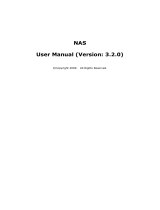
4
.............................................................................................................311
15. Backup
....................................................................................................... 311
15.1 External Drive
....................................................................................................... 313
15.2 USB One Touch Copy
....................................................................................................... 316
15.3 Remote Replication
....................................................................................................... 327
15.4 Time Machine
.............................................................................................................332
16. External Device
....................................................................................................... 332
16.1 External Storage Device
....................................................................................................... 333
16.2 USB Printer
..................................................................................................... 33416.2.1 Windows XP Users
..................................................................................................... 33616.2.2 Windows Vista/ Windows 7 Users
..................................................................................................... 33816.2.3 Mac OS X 10.4
..................................................................................................... 34316.2.4 Mac OS X 10.5
....................................................................................................... 349
16.3 UPS Settings
.............................................................................................................354
17. System Status
....................................................................................................... 354
17.1 System Information
....................................................................................................... 355
17.2 System Service
....................................................................................................... 356
17.3 Resource Monitor
.............................................................................................................359
18. Use the LCD Panel
.............................................................................................................366
19. NetBak Replicator
.............................................................................................................383
20. Connect to QNAP NAS from the Internet (DDNS Service)
.............................................................................................................391
21. Set SMS and Email Alert
.............................................................................................................400
22. Set up UPnP Media Server for Media Playing
.............................................................................................................409
23. Host a Forum with phpBB on QNAP NAS
.............................................................................................................421
24. NAS Maintenance Settings
....................................................................................................... 422
24.1 Restart/ Shut down Server
....................................................................................................... 424
24.2 Reset Administrator Password and Network Settings
....................................................................................................... 426
24.3 System Temperature Protection
....................................................................................................... 427
24.4 Troubleshooting-Abnormal RAID Operation




















